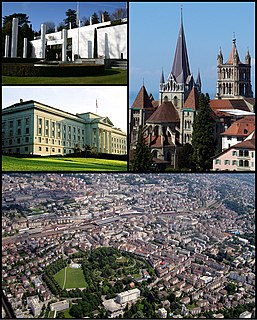
Lausanne is the capital and largest city of the Swiss French speaking canton of Vaud. It is a hilly city situated on the shores of Lake Geneva, about halfway between the Jura Mountains and the Alps, and facing the French town of Évian-les-Bains across the lake. Lausanne is located 62 kilometres northeast of Geneva, the nearest major city.
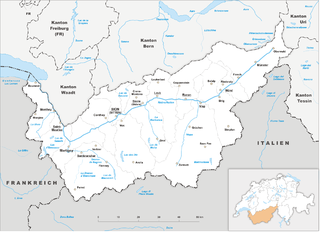
Valais, or Wallis, more formally the Canton of Valais, is one of the 26 cantons forming the Swiss Confederation. It is composed of thirteen districts and its capital and largest city is Sion. The flag of the canton is made of thirteen stars representing the districts, on a white-red background.

The Social Democratic Party of Switzerland or Swiss Socialist Party, is a political party in Switzerland. The SP has had two representatives on the Federal Council since 1960 and received the second highest total number of votes in the 2019 Swiss federal election.
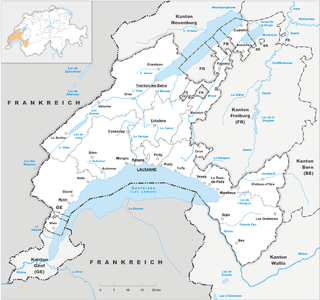
Vaud, more formally the canton of Vaud, is one of the 26 cantons forming the Swiss Confederation. It is composed of ten districts and its capital city is Lausanne. Its flag bears the motto "Liberté et patrie" on a white-green background.

The Swiss Party of Labour is a communist party in Switzerland. It is associated with the European United Left–Nordic Green Left group in the European Parliament, although Switzerland is not in the EU.

The Christian Democratic People's Party of Switzerland, also called the Christian Democratic Party, Democratic People's Party and Swiss Christian Democratic Party, PCD), was a Christian-democratic political party in Switzerland. On 1 January 2021, it merged with the Conservative Democratic Party of Switzerland (BDP/PBD) to form The Centre, which now operates at the federal level. The Christian Democratic People's Party will continue to exist at the cantonal level as individual local and regional parties determine their status.

The Liberal Party of Switzerland was a political party in Switzerland with economically liberal policies. It was known as a party of the upper class. On 1 January 2009 it merged with the larger Free Democratic Party (FDP/PRD) to establish FDP.The Liberals.

Romandy is the French-speaking part of western Switzerland. In 2018, about 2.1 million people, or 25.1% of the Swiss population, lived in Romandy. The majority of the romand population lives in the western part of the country, especially the Arc Lémanique region along Lake Geneva, connecting Geneva, Vaud and the Lower Valais.

Lesbian, gay, bisexual, transgender (LGBT) rights in Switzerland are progressive by European standards. Their history is one of liberalisation at an increasing pace since the 1940s, in parallel to the legal situation in Europe and the Western world more generally. Legislation providing for same-sex marriage, same-sex adoption, and IVF access was accepted by 64% of voters in a referendum on 26 September 2021, and entered into force on 1 July 2022.
Jeanlouis Cornuz was a Swiss writer.
Women in Switzerland gained the right to vote in federal elections after a referendum in February 1971. The first federal vote in which women were able to participate was the 31 October 1971 election of the Federal Assembly. In 1991 following a decision by the Federal Supreme Court of Switzerland, Appenzell Innerrhoden became the last Swiss canton to grant women the vote on local issues. Appenzell Innerrhoden is the smallest Swiss canton with c. 14,100 inhabitants in 1990.
Germaine Guex was a Swiss psychologist. She was particularly known for her work on abandonment syndrome in psychoanalysis.
Jean-François Fournier is a writer, playwright, poet and biographer Vaud.
Simone Chapuis-Bischof is a Swiss activist. She was an organizer for women's suffrage in Switzerland. She was also the head of the Association Suisse Pour les Droits de la Femme, and the president of the journal, Femmes Suisses.
Marceline Miéville was a Swiss dentist and a feminist politician. She was a member of the left-wing Parti ouvrier et populaire.
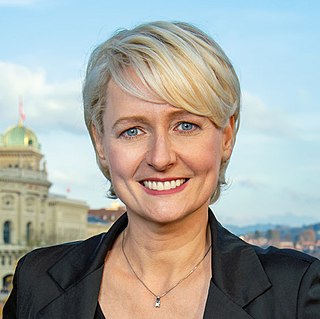
Isabelle Moret is a Swiss politician who served as President of the National Council from 2019 to 2020. A member of FDP.The Liberals since its foundation in 2009, she first entered the National Council in 2006 as a member of the Free Democratic Party (FDP/PRD). Moret is a resident of Yens-sur-Morges in the canton of Vaud.

Emma Kammacher was a Swiss human rights lawyer, activist and politician. She was a member of the Social Democratic Party of Switzerland and served as a member of the Grand Council of Geneva. In 1965 she became the first woman to serve as president of a Swiss cantonal council.

Elisabeth Blunschy was a Swiss politician. She served as the first woman President of the National Council of Switzerland and was one of the first women elected to the National Council of Switzerland.

The Centre or Alliance of the Centre is a centre-right political party in Switzerland. It was formed through the merger of the Christian Democratic People's Party of Switzerland (CVP) and the Conservative Democratic Party of Switzerland (BDP). Following the formal merger of the parties on 1 January 2021, it has 28 of 200 seats in the National Council and 13 of 46 seats in the Council of States. Viola Amherd is the party's representative on the Federal Council.
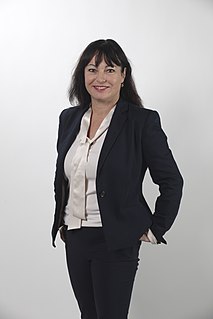
Géraldine Savary is a journalist and politician of the Social Democratic Party of Switzerland (SP), former member of the National Council and the Council of States and the current director of the Federal Commission of the Swiss postal services, PostCom.














